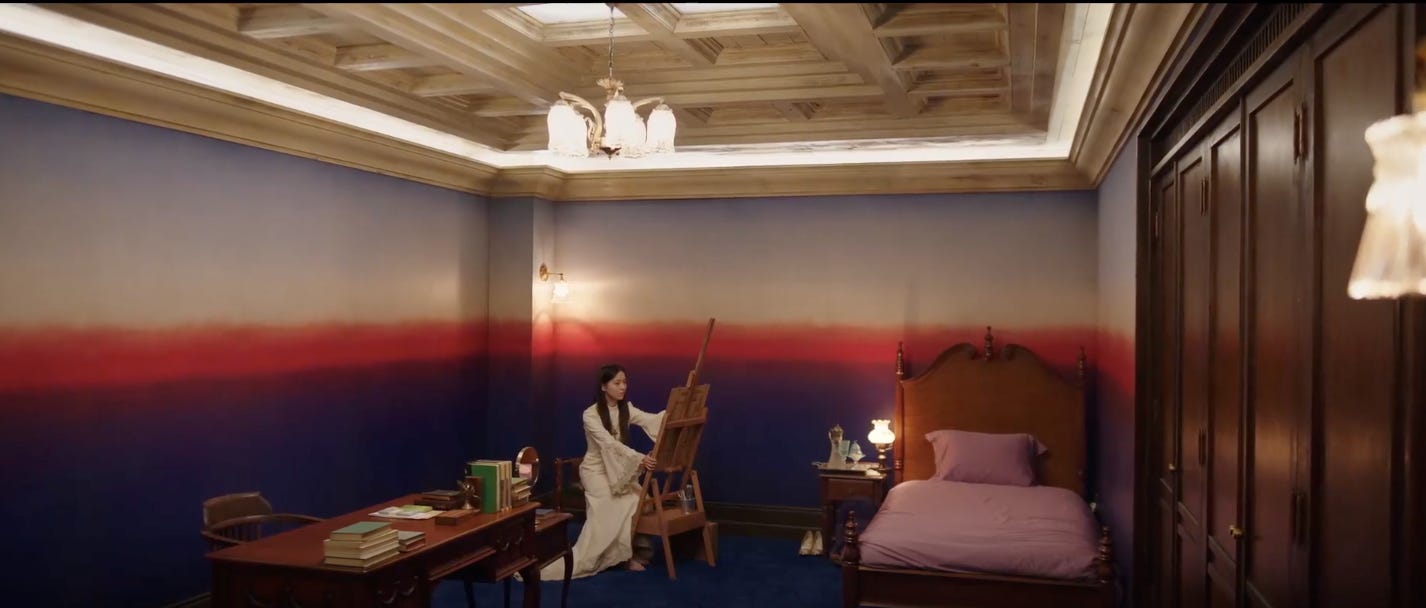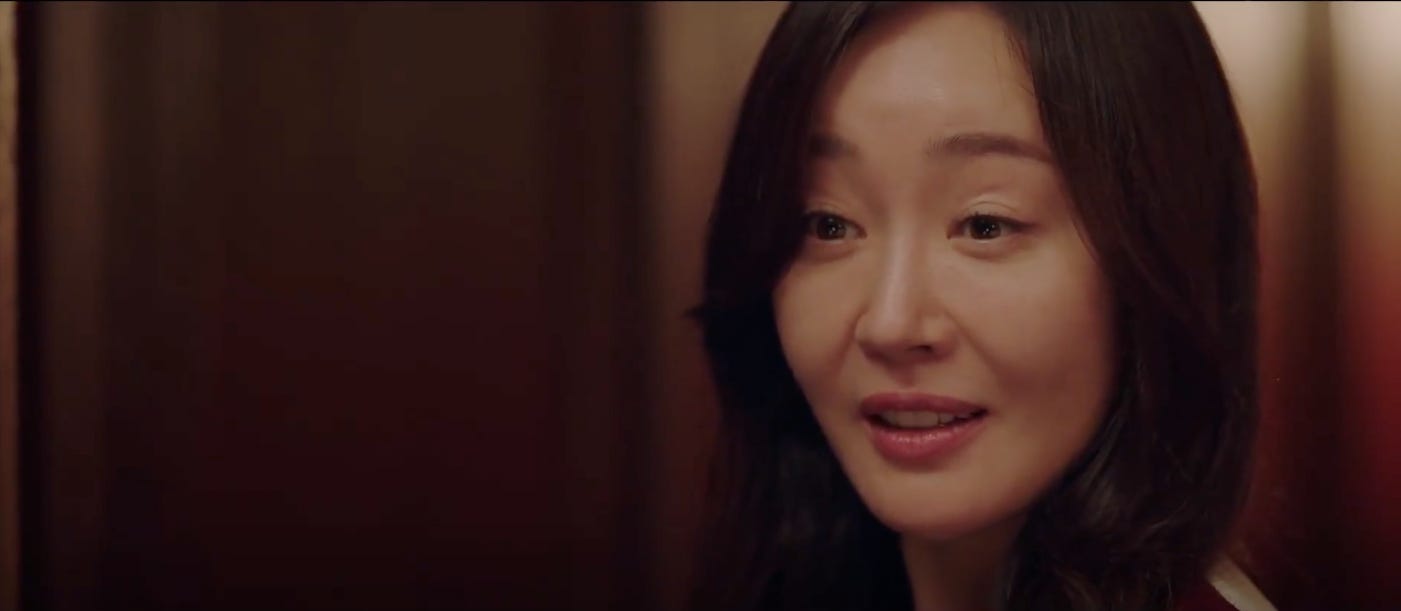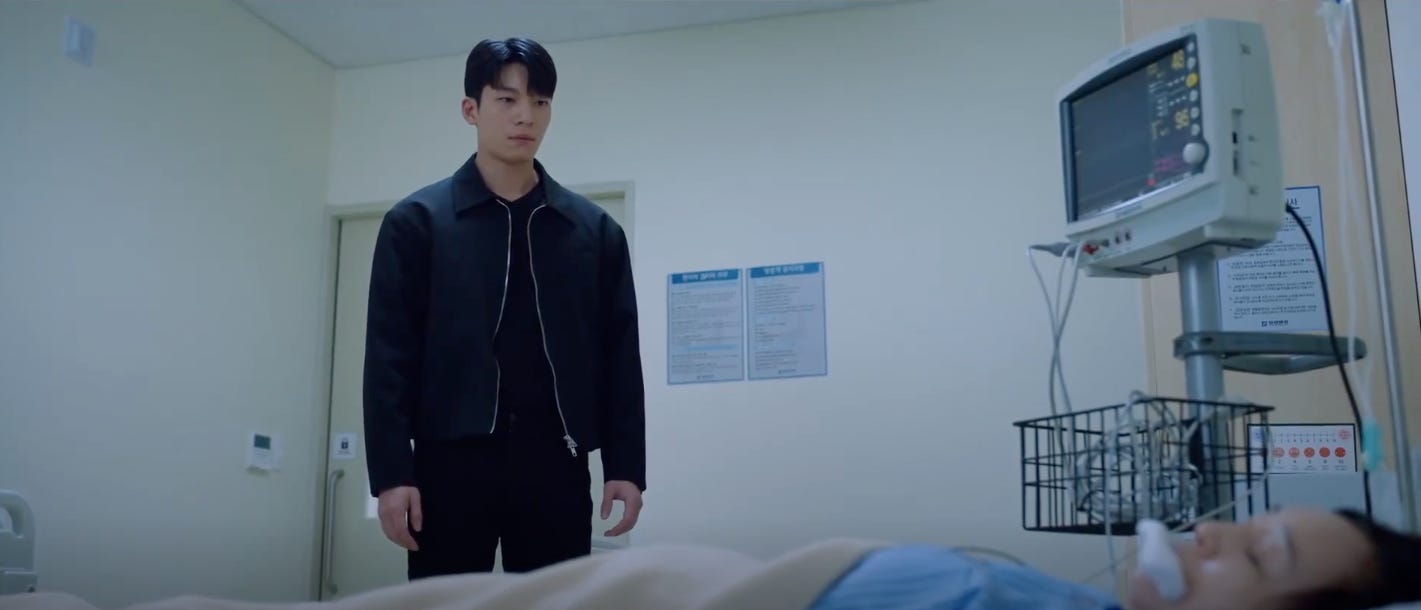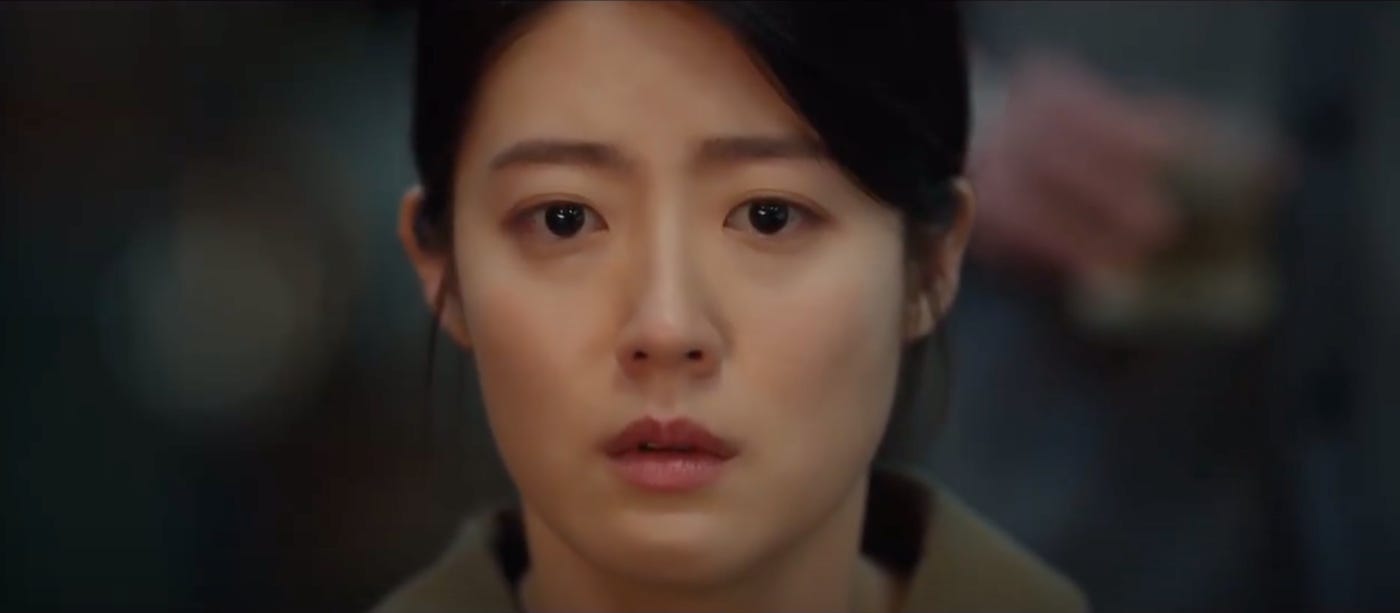The writer it seems to me is making the case for the Oh sisters despite their obvious character flaws and skill deficiencies. It’s not an entirely convincing thesis given the scenario at hand but perhaps she’s expecting at least a B for effort. The argument goes something like this: The ordinary Oh sisters have very little among them but their commitment to each other. They will do anything for one another and that might include breaking the law whenever expedient to do so. When faced with a common enemy they assemble as a united front. Whatever they lack in ability is made up by their resilience and devotion to each other. Those who look on, are moved by their simplicity and rally around them. Of course all that assumes they are surrounded by people of goodwill who put themselves on the line to protect them.
While this Little Women might claim to be a homage to Louisa M. Alcott’s beloved novel and superficially the characters bear passing resemblance, its actual roots lie in the popular South Korean weekend family dramas that dominated television ratings with impunity when I first traversed the K drama landscape. These are infamous for their ridiculous plotlines punctuated by unbelievable twists and turns, protracted conflicts that are designed to leave audiences begging for more week after week. It’s a combination of pure farce, high melodrama and an unabashed (even gleeful) exploitation of tropes. Morality tales masquerading as soap operas. They’re crowd pleasers because they are calculated to excite a whole gamut of emotions, most notably outrage. Common sense, logic and plausibility are not script priorities by any stretch of the imagination. Intelligence and resourcefulness are seldom the hallmark of the much maligned and mistreated female protagonist but she must be sufficiently likeable and resilient to elicit the right kind of sympathy from her ever-increasing network of allies who will come to her aid in her hour of need.
The template is complete when she is up against a far more crafty female antagonist who is scheming actively against the so-called good guys because they pose some kind of threat to her position in their shared or overlapping context. Here of course we have Won Sang-a who is depicted as a supervillain along the lines of Poison Ivy. It’s not a stretch to think in those terms when she even has her own hallucinogenic orchid growing in a temperature controlled room. Lately she’s suffered something of a blow from Team Good Guys and what does she do first in response? She eliminates her greatest liability — the husband that fails to deliver on his promises. Since he’s become a laughingstock, her consort spouse is no longer her golden haired boy and has outlived his usefulness. In traditional Jeongran Society fashion he must be disposed of immediately. His sin as far as she’s concerned, is that he’s shattered her dream of becoming Queen of Korea. Worse still, Won Sang-a, by extension has been utterly humiliated by mere plebs who don’t know their place.
Failing to become queen untainted, Won Sang-a is gradually transforming into the witch-like figure reminiscent of many a Grimm fairytale. She locks In-hye in the The Closed Room, a place her own mother was imprisoned by General Won for over 2000 days. (Closer to 3000 days actually) The Late Mrs Won, a deeply religious woman, threatened to expose the General’s crimes to her church folk and refused to budge. Furthermore Won Sang-a doles out drugs to the people around her with frightening liberality and the show makes a point of it. Not too coincidentally the Greek word from which the word “pharmacy” is derived can also be translated “sorcery”, “witchcraft” or “spells”.
While Oh In-kyung might be the face of this momentary (possibly pyrrhic) victory against Team Evil, she’s not the architect of it. That honour goes to Choi Do-il in my book. It’s true that In-kyung brings all these voices together under one roof but Do-il who has plenty to lose if the Park-Won juggernaut gets their way, comes up with a plan capped off with the element of surprise. He gets his chance when his mother is released from prison after an alleged suicide attempt. The man is observant, meticulous and tactical. The number of times In-joo would have died if it weren’t for him. When In-joo asks him, “How can I trust you?”, it seems to be the wrong question. The right question should be: How can she not? Does she even really have a choice? Let’s not forget too that if she dies, he gets all the cash.
Whatever doubts In-joo (and the audience) might have about Do-il’s credibility, I have none. His record speaks for itself. Sang-a’s forked tongue might have shaken In-joo but honestly… he has proven himself time and time again, doing all kinds of unnecessary things that benefit her. He could have easily run off with the 70 billion won already while she was soundly asleep in the hotel. In fact when she offered to give him the whole lot at one point, he rejected her offer and stuck to the original terms of their agreement. He certainly didn’t have to help the sisters in their efforts to thwart Park Sang-jae’s bid for public office. If he is the scoundrel that he claims to be, he and his mother could have quite easily taken off in the plane as planned and not antagonize the Park-Won mob any further. Instead he scams his former employers and nags at his dad to keep a watchful eye on In-joo. Then of course he hangs around to provide support as In-kyung executes her plan to humiliate Park Sang-jae in front of his adoring followers.
Right from the start Do-il has been protecting In-joo in unexpected ways and usually under the cloak of “protecting the money”. Her safety is always paramount to him. He didn’t need to make a deal with her. He could have taken the money, the ledgers off her the moment he found out that she had it. It’s not as if she’s blessed with a great deal of shrewdness or physical strength. He didn’t need to hang around Great-aunt Oh’s place when she stupidly carried the blue orchid into the house. In Singapore he didn’t have to accessorize her with earrings and bracelets on top of the stunning green dress. When In-hye gets locked up in the Won castle, he goes looking for her with In-joo in tow.
If anything Do-il probably likes In-joo more than he lets on and probably from as early as when Jin Hwa-young was still walking around in high heeled shoes. He knew she was considered an “outcast” and yet he went to her department to look for her personally and asked for her by name. In the same way he stood up for In-joo when In-kyung was trying to embarrass her in front of him about her status as a divorcee and her penchant for men who drive German cars.
Despite everything he says/does to maintain a friendly distance, she can sense that there’s a decent human being lurking under the business-like surface. Among all the people she’s crossed paths with, she claims that he’s the kindest person she’s ever met. Intuitively she knows that he treats her better than he really needs to considering the stated terms of their relationship. What’s particularly interesting it seems to me is that his actions are the opposite of a con man. A con man pretends it’s about love when it’s all about the money. In the case of Do-il, he comes across as someone who pretends it’s all about the money when it’s probably more about love.
The two more recent episodes also features some progression in In-kyung and Jong-ho’s dynamic when the latter finally confesses in backhanded fashion. It’s been the elephant in the room that Jong-ho has been reluctant to broach lest he gets friendzoned again. Although she rejects him out of hand with a tactic that I loath — claiming she knows what Jong-ho really thinks about her better than Jong-ho himself does — I’m sure she must have thought that his timing was terrible as her mind is completely on loftier thoughts working for a just cause and doing an expose on Park Sang-jae.
In our more recent podcast where absoluteM and I discussed why we’re not fans of In-kyung despite enjoying other projects featuring Nam Ji-hyun, we talked about how there’s something unappealing about her despite her commendable agenda. I especially liked Nam Ji-hyun’s character in 365: Repeat the Year and loved her chemistry with Lee Joon-hyuk. However, I’ve lately come to see the In-kyung character as a plot device to push forward the crime investigation part of the show rather than a living breathing personality. Plus Nam Ji-hyun plays In-kyung as someone who seems perpetually angry like a bulldog. Her righteous fervour comes across as zealotry in the extreme with something to prove. Jong-ho is definitely on to something here when he mentions guilt as the animating driver in what she’s been doing. She was the one that was picked to live with her wealthy great aunt while her sisters were raised in a hand to mouth existence. Unfortunately this character presents a puzzling dilemma for me because as a rule I root for the underdog in these types of stories and for the villains to get their comeuppance. Here, while I think Won Sang-a should find her way to a padded cell at the end of all this, I just want the boys to stay alive long enough get the girls. That’s all I ask. When In-kyung tells In-joo that she has to stay in the country to get justice for the victims, it rings rather hollow. It feels ominously like she’s being set up for a wake-up call.
At the end of the day, this show is a fairytale and there’s no way to defend it on the basis of realism. That’s a lost cause. And it’s bound to do anyone’s head in. The girls might be realistic in their flaws but it’s not realistic that they haven’t seen the inside of a coffin yet. In reality if this were a serious crime show, the body pile up should be a lot higher and someone with the idiosyncrasies of In-kyung would not be spearheading a criminal investigation of such magnitude.









I really enjoyed reading the above, I think you really have summed up this series so well. I have sometimes felt that the makjang genre is just an excuse for sloppy, lazy, even poorly researched writing, a commercially driven, maximise the viewer numbers product. I was getting frustrated with some aspects of this drama, because the cast is so very good, and I felt it was spiralling into the stupid, expedient realm. But through the lens you suggest it seems better, basically just entertaining.
Fingers crossed about Choi do-il, he might just be too good to believe, I really hope not, he's a great, charming hero.